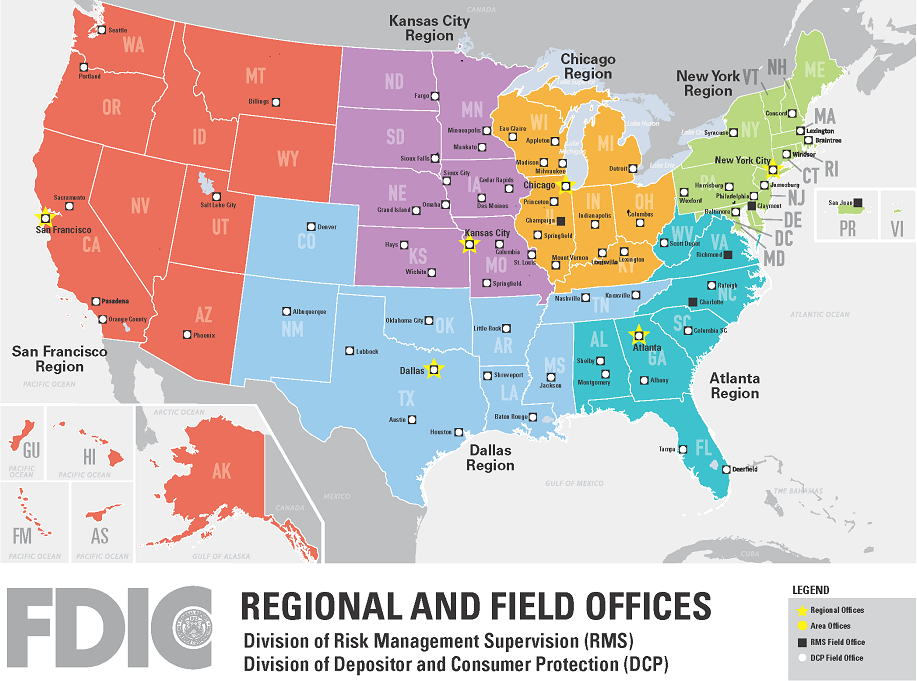The FDIC’s Financial Institution Intern Program provides high-performing college students with valuable professional experience in the financial regulatory industry. Financial Institution Interns (FII) will be able to earn a competitive salary while pursuing degrees in Accounting, Business, Economics, Finance, and other related majors.
The program provides hands-on experience evaluating bank operations, risk management strategies, and consumer protection practices. Interns will gain knowledge of evolving issues faced by the banking industry, and learn in-depth banking laws and regulatory procedures, while working with experienced FDIC professionals to ensure institutions are following safe and sound banking practices. In this unique program, participants will have an opportunity to participate in on-site bank examinations and understand supervisory proceedings. This requires team-orientated individuals with strong analytical and quantitative skills who possess the ability to effectively communicate both orally and in writing.
At the conclusion of the summer, an intern may be offered the option to work part-time and/or during school breaks as long as the incumbent remains a student.
Upon successful completion of the program, some participants may be offered full-time (post-graduation) positions as a Financial Institution Specialist in one of the FDIC’s driver divisions – Division of Risk Management Supervision (RMS) or Division of Depositor and Consumer Protection (DCP).
What Is It Like to Work as a FII at the FDIC?
Benefits
Interns may be eligible for certain Federal employee benefits. Please see the FDIC benefits page for additional information.
Other Information
Financial Institution Interns will be responsible for providing their own housing; however, a $2500 stipend (in addition to bi-weekly compensation) will be allotted at the beginning of the program.
Additionally, travel, including overnight, to remote work sites may be required. Bank examinations are conducted on-site at banks, sometimes at great distance from the office. Travel expenses are reimbursable, but individuals are responsible for providing their own transportation to bank examination sites (public transportation may not be available).
Key Requirements
- U. S. citizenship.
- Enrolled at least half-time in a bachelor’s degree program at an accredited college or university.
- Completion of the sophomore year with a major in economics, finance and accounting.
- Successful completion of the FDIC's background investigation requirements. Moderate Risk Position - Minimum Background Investigation (MBI) Required.
- Must be registered with Selective Service (males born after Dec 31, 1959).
Applicants must possess at least a 3.25 GPA to enter the program and all interns are required to sign the FDIC Internship Program Participant Agreement.
Vacancies

| Region | Vacancies |
|---|---|
| Atlanta Region (South-Eastern US) | No FII vacancies at this time in this region |
| Chicago Region (East-North-Central US) | No FII vacancies at this time in this region |
| Dallas Region (South-Central US) | No FII vacancies at this time in this region |
| Kansas City Region (West-North-Central US) | No FII vacancies at this time in this region |
| New York Region (North-Eastern US) | No FII vacancies at this time in this region |
| San Francisco Region (Western US) | No FII vacancies at this time in this region |
Other Opportunities
If there are no vacancies available you may:
- Talk to a FDIC recruiter at a participating campus recruiting event to learn more about the program.
On Campus Recruiting
Professional Events - Contact a participating college career placement office at an FDIC targeted school or professional organization/association.
List of participating colleges and universities
List of professional organizations and associations
The FDIC is an equal opportunity employer. We recruit, hire, and develop a high-performing workforce that reflects the communities we serve. Applicants are considered without regard to their race, religion, color, sex (including pregnancy, gender identity, and sexual orientation), national origin, disability, age, genetic information, retaliation, parental status, or other non-merit factors.
